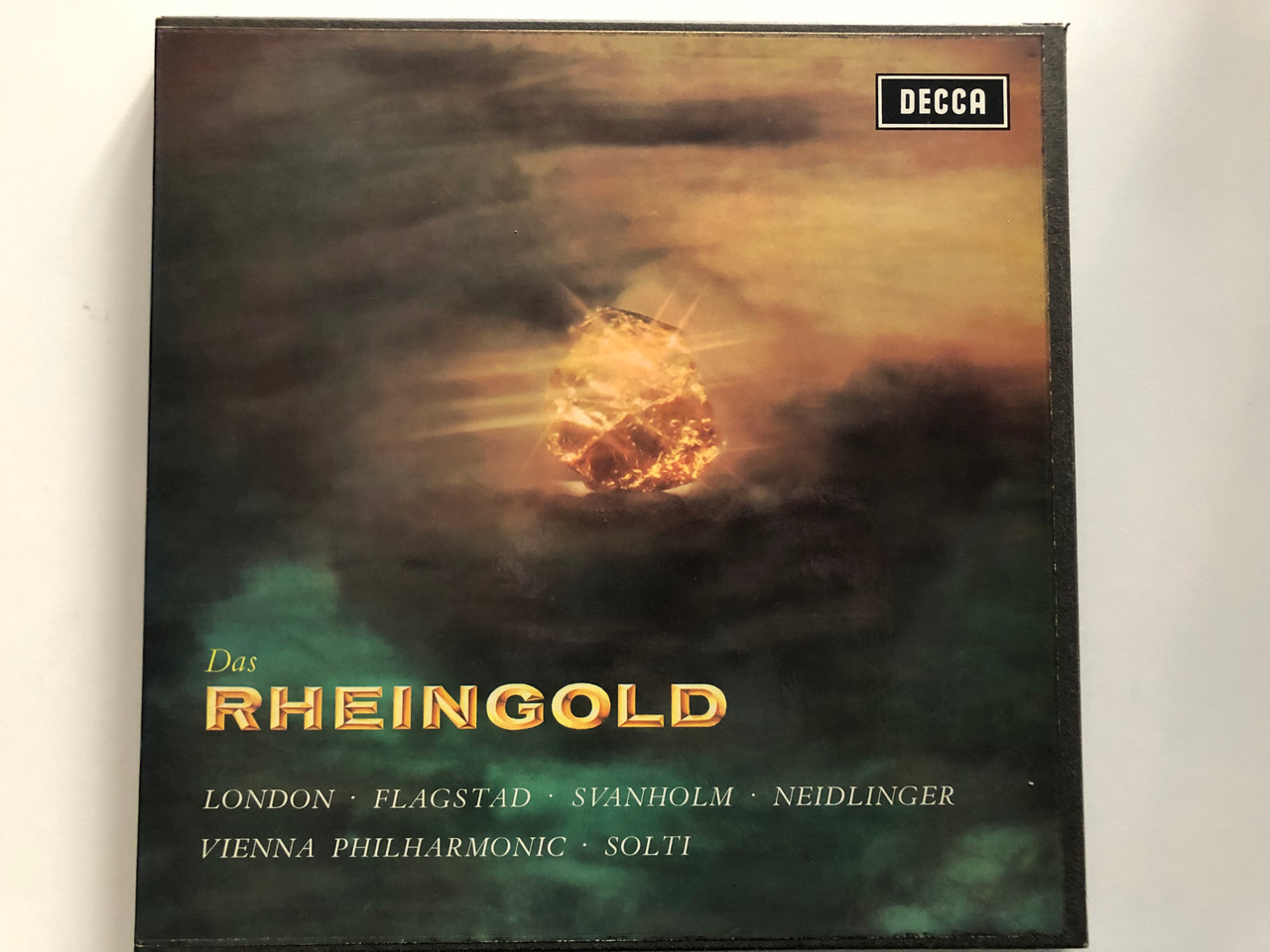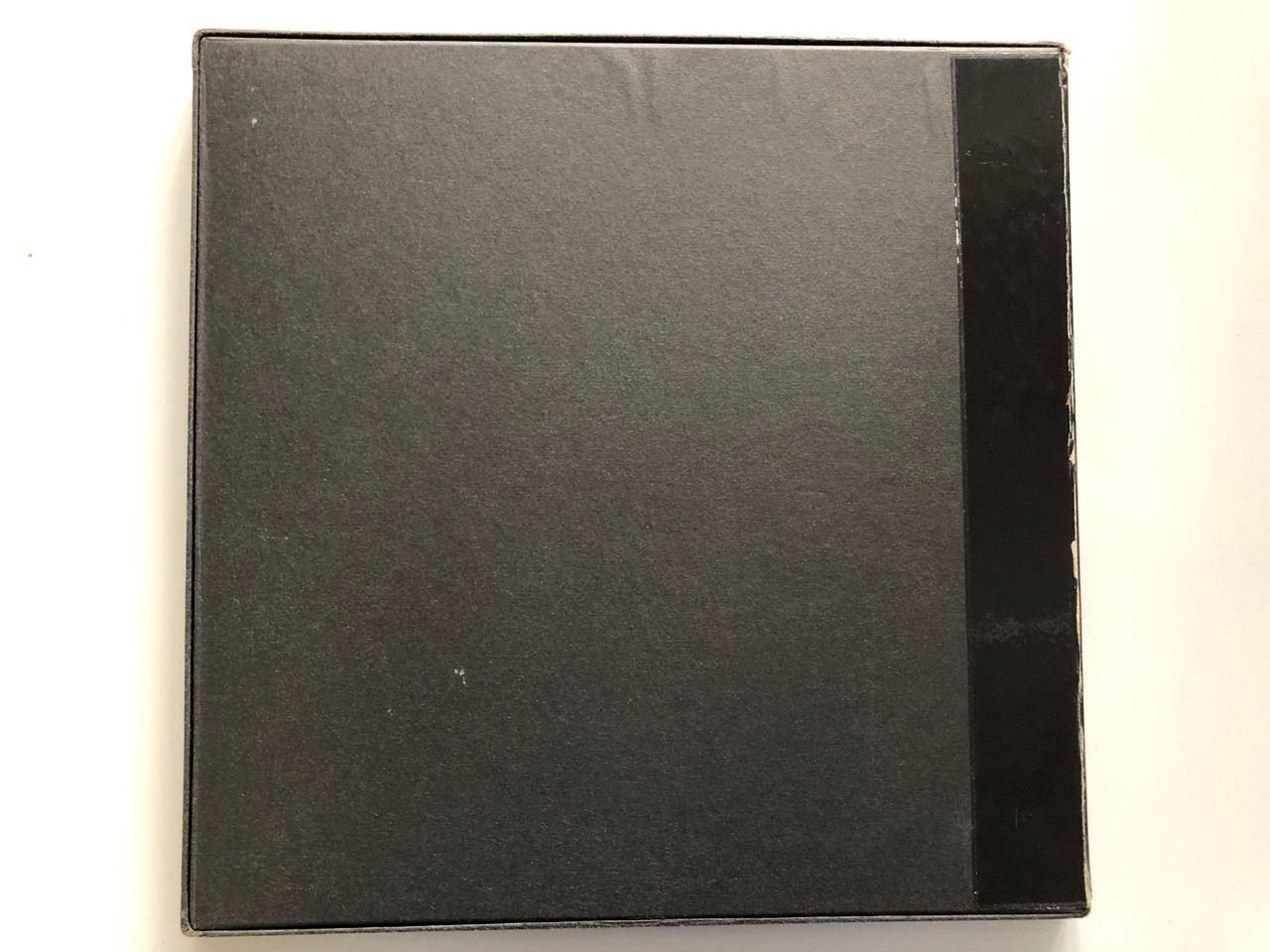Description
Das Rheingold / London, Flagstad, Svanholm, Neidlinger, Solti, Vienna Philharmonic, Solti / Decca 3x LP 1968 Stereo
SET 382/4
Das Rheingold (The Rhinegold), WWV 86A, is the first of the four music dramas that constitute Richard Wagner's Der Ring des Nibelungen, (English: The Ring of the Nibelung). It was performed, as a single opera, at the National Theatre Munich on 22 September 1869, and received its first performance as part of the Ring cycle at the Bayreuth Festspielhaus, on 13 August 1876.
Wagner wrote the Ring librettos in reverse order, so that Das Rheingold was the last of the texts to be written; it was, however, the first to be set to music. The score was completed in 1854, but Wagner was unwilling to sanction its performance until the whole cycle was complete; he worked intermittently on this music until 1874. The 1869 Munich premiere of Das Rheingold was staged, much against Wagner's wishes, on the orders of his patron, King Ludwig II of Bavaria. Following its 1876 Bayreuth premiere, the Ring cycle was introduced into the worldwide repertory, with performances in all the main opera houses, in which it has remained a regular and popular fixture.
In his 1851 essay Opera and Drama, Wagner had set out new principles as to how music dramas should be constructed, under which the conventional forms of opera (arias, ensembles, choruses) were rejected. Rather than providing word-settings, the music would interpret the text emotionally, reflecting the feelings and moods behind the work, by using a system of recurring leitmotifs to represent people, ideas and situations. Das Rheingold was Wagner's first work that adopted these principles, and his most rigid adherence to them, despite a few deviations – the Rhinemaidens frequently sing in ensemble.
As the "preliminary evening" within the cycle, Das Rheingold gives the background to the events that drive the main dramas of the cycle. It recounts Alberich's theft of the Rhine gold after his renunciation of love; his fashioning of the all-powerful ring from the gold and his enslavement of the Nibelungs; Wotan's seizure of the gold and the ring, to pay his debt to the giants who have built his fortress Valhalla; Alberich's curse on the ring and its possessors; Erda's warning to Wotan to forsake the ring; the early manifestation of the curse's power after Wotan yields the ring to the giants; and the gods' uneasy entry into Valhalla, under the shadow of their impending doom.
Tracklist:
| Das Rheingold | |||
| A1 | Prelude And Scene 1: Weia! Waga! Woge! Du Wellen - Hehe Ihr Nicker - Lugt Schwestern! - Interlude | ||
| B1 | Scene 2 (Pt. 1): Wotan, Gemahl! Erwache! - Hilf Mir Schwester! - Sanft Schloss Schlaf Dein Aug' - Endlich Loge! | ||
| C1a | Scene 2 (Concl): Umsonst Sucht Ich (Loge's Narration) - Interlude (Wotan And Loge Descend To Nibelheim) | ||
| C1b | Scene 3 (Pt. 1): Hehe! Hieher! Tuckisher Zwerg | ||
| D1a | Scene 3 (Concl): Wer Hilfe Mir! - Gehorchen Muss Ich Den Leibichen Bruder - Was Wollt Ihr Hier? - Interlude (Wotan And Loge Return From Nibelheim) | ||
| D1b | Scene 4 (Pt. 1): Da, Vetter Sitze Du Fest! | ||
| E1 | Scene (Pt. 2): Gezahlt Hab'Ich - Bin Ich Nun Frei? (Alberich's Curse) - Fasolt Und Fufner Nahen Von Fern - Weiche, Wotan! Weiche! (Erda's Warning) | ||
| F1 | Scene 4 (Concl): Geheimnisshehr Hallt Mir Dein Wort - Heda! Heda! Hede! - Abendlich Strahlt Der Sonne Auge (Entry Of The Gods Into Valhalla) |
- Artwork [Booklet illustrations by] – Arthur Rackham
- Baritone Vocals [Donner] – Eberhard Wächter
- Baritone Vocals [Wotan] – George London (2)
- Bass Vocals [Alberich] – Gustav Neidlinger
- Bass Vocals [Fafner] – Kurt Böhme
- Bass Vocals [Fasolt] – Walter Kreppel
- Composed By – Richard Wagner
- Conductor – Georg Solti
- Liner Notes – John Culshaw, Robert Boas
- Mezzo-soprano Vocals [Erda] – Jean Madeira
- Mezzo-soprano Vocals [Flosshilde] – Ira Malaniuk
- Mezzo-soprano Vocals [Wellgunde] – Hetta Plumacher
- Orchestra – The Vienna Philharmonic Orchestra
- Photography By [Cover photo] – Hans Wild (2)
- Producer – John Culshaw
- Soprano Vocals [Freia] – Claire Watson
- Soprano Vocals [Fricka] – Kirsten Flagstad
- Soprano Vocals [Woglinde] – Oda Balsborg
- Tenor Vocals [Froh] – Waldemar Kmentt
- Tenor Vocals [Loge] – Set Svanholm
- Tenor Vocals [Mime] – Paul Kuen



























